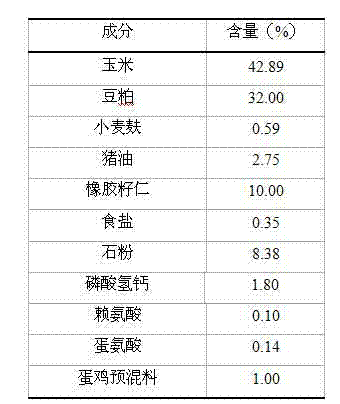Eggs rich in omega-3 polyunsaturated fatty acids and preparation method
A technology of unsaturated fatty acids and eggs, applied in applications, animal feed, animal feed, etc., can solve the problems of unbalanced ratio of polyunsaturated fatty acids, insufficient intake of omega-3 series fatty acids, etc., and achieve large planting area and resource Sufficient and good enrichment effect
- Summary
- Abstract
- Description
- Claims
- Application Information
AI Technical Summary
Problems solved by technology
Method used
Image
Examples
Embodiment 1
[0026]Add 10% of the total amount of laying hen feed to the non-transgenic chicken feed, and adjust the feed ingredients accordingly. Add 5 international units of vitamin E per kilogram of feed. The feed composition and the content of each component are: :
[0027]
[0028] Feed the above-mentioned chicken feed to 130-140-day-old laying hens of the sea blue gray variety, adopt cage feeding, feed in a trough, eat freely, keep water, and after feeding for 2 weeks, eggs rich in omega-3 series fatty acids are obtained. After analysis by GC-MS, the contents of omega-3 series fatty acids in each egg (edible part) are DHA: 116.8mg, EPA: 87.9mg, 102.1mg, the total content is 306.8mg.
Embodiment 2
[0030] 15% of the total amount of laying hen feed was added rubber seed kernels to the feed of non-transgenic laying hens, and the feed was adjusted accordingly. 5 international units of vitamin E were added per kilogram of feed. The feed composition and the content of each component were :
[0031] Element content(%) corn 42.89 soybean meal 27.09 wheat bran 0.59 lard 2.66 rubber seeds 15.00 salt 0.35 stone powder 8.38 Calcium hydrogen phosphate 1.80 Lysine 0.10 Methionine 0.14 Layer Premix 1.00
[0032] Feed the above-mentioned chicken feed to 130-140-day-old laying hens of the sea blue gray variety, adopt cage feeding, feed in a trough, eat freely, keep water, and after feeding for 3 weeks, eggs rich in omega-3 series fatty acids are obtained. After analysis by GC-MS, the content of omega-3 series fatty acids in each egg (edible part) is DHA: 149.4mg, EPA: 101.4mg, 107.2, the total content is...
Embodiment 3
[0034] Add 20% rubber seed kernels of the total amount of feed for laying hens in the feed of non-transgenic laying hens, and adjust the feed accordingly. Add 5 international units of vitamin E per kilogram of feed. The feed composition and the content of each component are:
[0035] Element content(%) corn 42.89 soybean meal 22.25 wheat bran 0.59 lard 2.5 rubber seeds 20.00 salt 0.35 stone powder 8.38 Calcium hydrogen phosphate 1.80 Lysine 0.10 Methionine 0.14 Layer Premix 1.00
[0036] The above-mentioned chicken feed was fed to layer hens aged 130-140 days, and they were raised in cages, fed in troughs, free to eat and drink, and kept water. After feeding for 4 weeks, eggs rich in omega-3 series fatty acids were obtained. After analysis by GC-MS, the contents of omega-3 series fatty acids in each egg (edible part) are: DHA: 225.4mg, EPA: 156.5mg, 110.9mg, the total content is 492.8mg.
PUM
 Login to View More
Login to View More Abstract
Description
Claims
Application Information
 Login to View More
Login to View More - R&D
- Intellectual Property
- Life Sciences
- Materials
- Tech Scout
- Unparalleled Data Quality
- Higher Quality Content
- 60% Fewer Hallucinations
Browse by: Latest US Patents, China's latest patents, Technical Efficacy Thesaurus, Application Domain, Technology Topic, Popular Technical Reports.
© 2025 PatSnap. All rights reserved.Legal|Privacy policy|Modern Slavery Act Transparency Statement|Sitemap|About US| Contact US: help@patsnap.com

